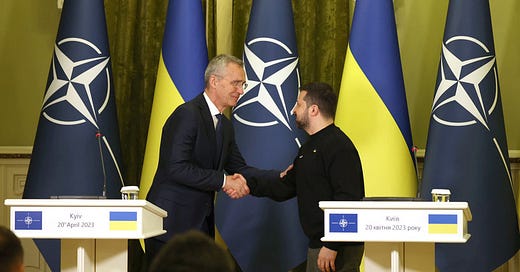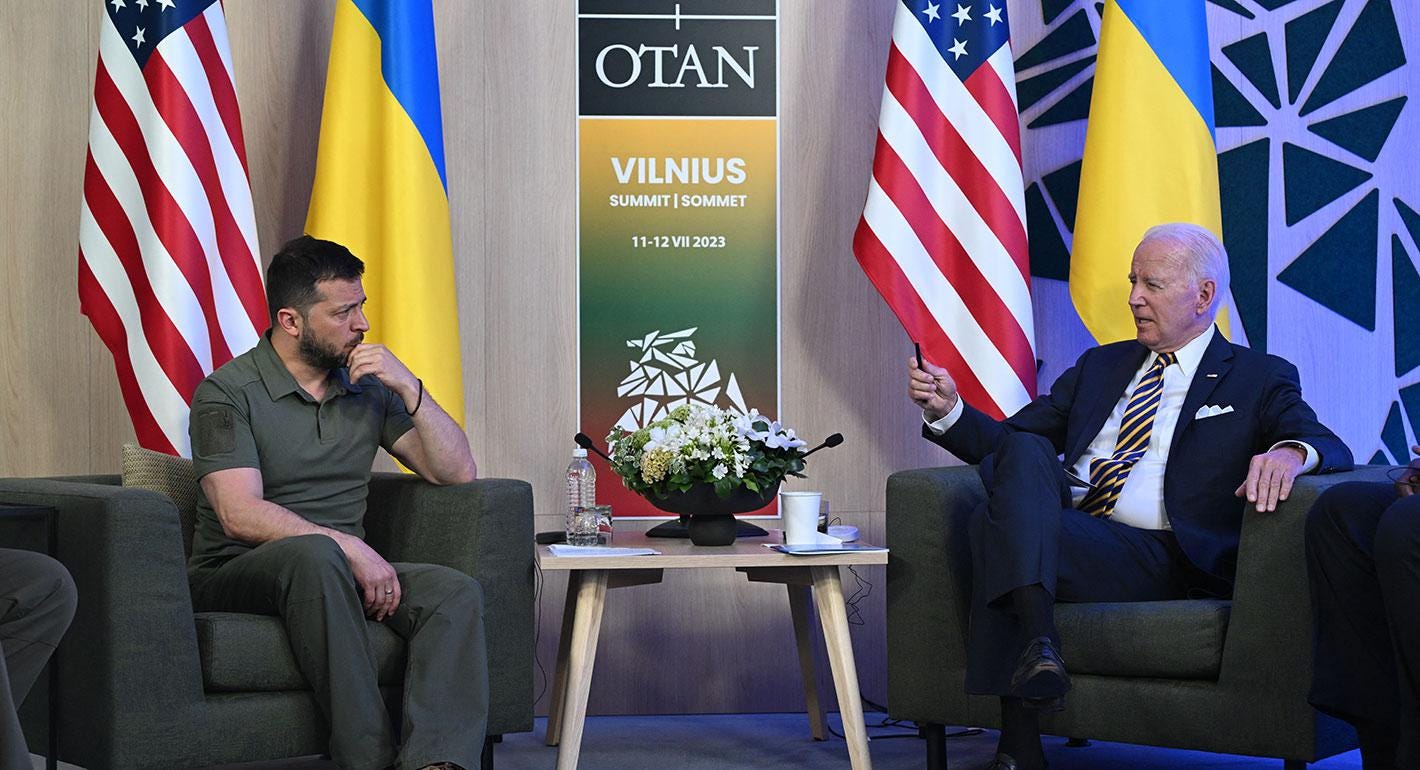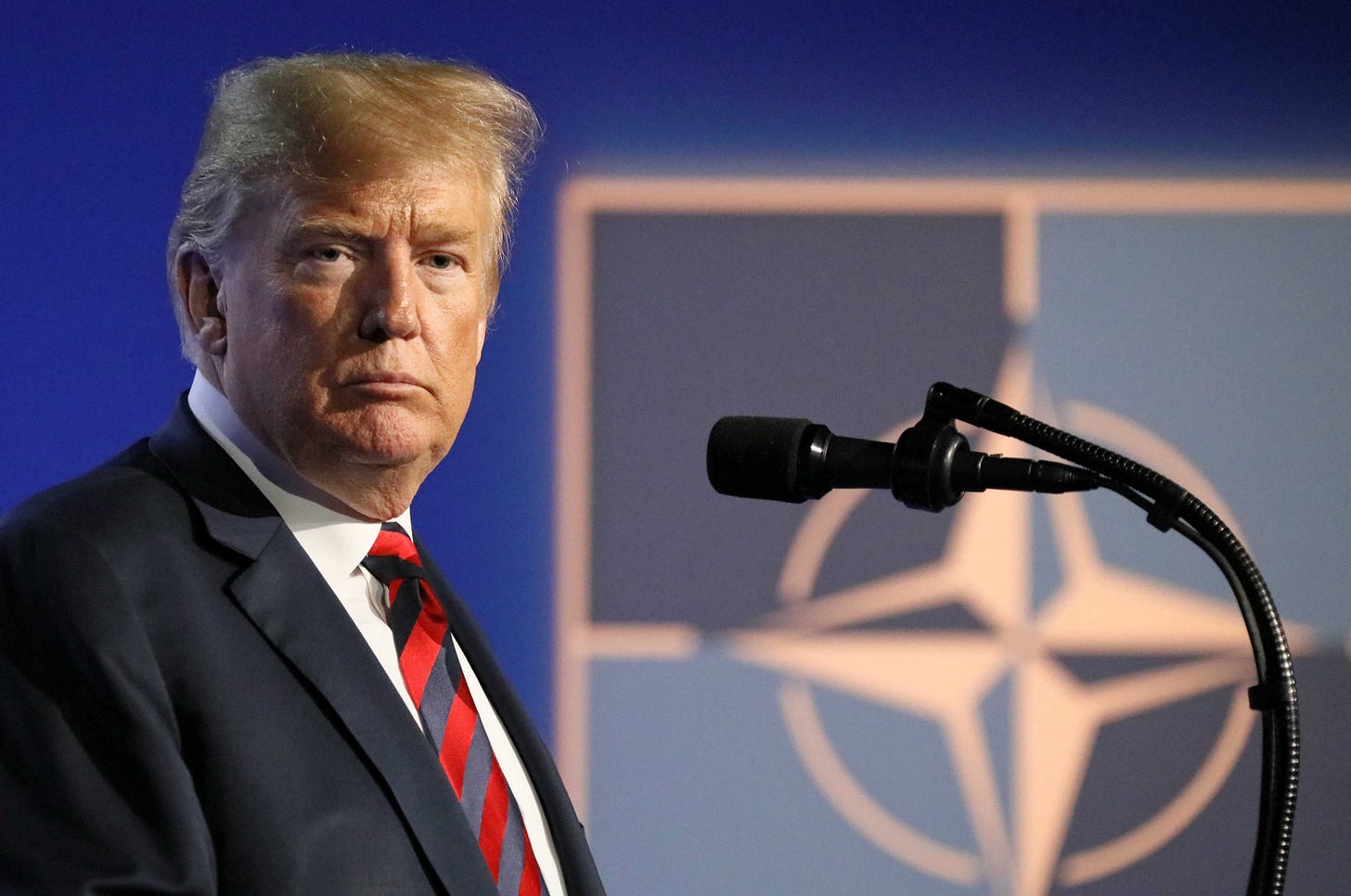NATO's Ukraine strategy
The alliance is contemplating a "special envoy" to Ukraine to coordinate support for Volodymyr Zelenskyy's government
An article in Foreign Policy on Friday by Robbie Gramer revealed that NATO is considering appointing a special envoy to Ukraine, a high-profile figure who would be based permanently in Kyiv and would be the first point of contact for relations between Ukraine and the alliance as well as coordinating military assistance to the country from NATO member states.
The post would be modelled on the NATO senior civilian representative in Afghanistan, which existed from 2003 to 2021 and whose role was to represent NATO’s political leadership and “liaise with the authorities, civil society, representatives of the international community and neighbouring countries”. It was occupied by some heavyweight figures, including two British diplomats: Mark Sedwill (2010-11) and Nicholas Kay (2019-20). As Graber notes, the creation of an analogous post in Ukraine would “send a political message to both Ukraine and Russia about the alliance’s commitment to Kyiv’s fight” as well as providing a coordinating focus for assistance of all forms.
The idea will be on the agenda at next month’s NATO summit in Washington. This is a significant and historic meeting for the alliance, as it falls in the year of NATO’s 75th anniversary. It is only the third time that heads of state and government will have come together in the capital of NATO’s largest military power and contributor, the previous times being 1978 (when détente was under extreme pressure) and 1999 (the 50th anniversary of the North Atlantic Treaty). It is likely to be the first NATO meeting at which the United Kingdom is represented by Sir Keir Starmer, and attendees will be acutely aware that it could be the last for President Joe Biden. It will also be the last summit of Jens Stoltenberg’s 10-year stint as secretary general, and it is likely that leaders will all but agree on his successor, almost certainly Mark Rutte, the outgoing prime minister of the Netherlands.
(I have said before and continue to think that Rutte is not the best candidate for secretary general: his 14 years in power have seen very slow growth in defence spending by the Netherlands and the country is not expected even to meet the long-standing NATO minimum of two per cent of GDP until next year. Rutte also came into circulation as a potential candidate quite late, which suggests that he has only turned his attention to the possibility after realising that his premiership was eventually coming to an end, and that he may be something of a compromise candidate, unacceptable to no-one but hardly inspiring. There were much better names, not least Estonian prime minister Kaja Kallas and former UK defence secretary Ben Wallace.)
Julianne Smith, America’s permanent representative to NATO, explained:
We’re looking at ways to institutionalise some of the bilateral support that has flowed to Ukraine and put it into the NATO alliance, to bring greater coherence to that assistance and to ensure that there is adequate burden-sharing across the alliance in our collective support to Ukraine.
However, there is a more cynical school of thought which regards the creation of a special envoy as a kind of consolation prize for deferring any decision or progress of Ukraine’s application for membership of NATO. Graber quotes an anonymous NATO official saying “It’s part of a consolation prize we’re all trying to craft. It’s another example of things we are doing in lieu of what Ukraine actually wants us to do.”
I think that is slightly unfair. It is certainly true that some NATO member states could do more to support Ukraine than has so far been done. The delay in approving the latest $60 billion package of assistance by the United States Congress was discreditable and has done real damage to Ukraine’s military situation on the ground, and there are justifiable fears that a second Trump presidency would see any further aid vastly reduced or scrapped altogether. Equally, the restrictions placed on the use of some NATO-supplied weaponry, especially the continuing ban by the United States on using ATACMS tactical ballistic missiles to strike targets inside Russia, are absurd. They have been kept in place by a nebulous fear of “escalating” the conflict but are an unjustifiable limitation on Ukraine’s military strategy. As Lieutenant General Ben Hodges, former commanding general, United States Army Europe, said recently:
There is no moral, legal, or military reason for restricting them from using ATACMS, or any other weapon that we give them across the border… [the US is] giving Russia sanctuary from which they’re murdering innocent Ukrainian people.
Nevertheless, NATO has made it clear that Ukraine’s membership is, in principle, agreed. At last year’s summit in Vilnius, it was stated explicitly that:
Ukraine’s future is in NATO. We reaffirm the commitment we made at the 2008 Summit in Bucharest that Ukraine will become a member of NATO, and today we recognise that Ukraine’s path to full Euro-Atlantic integration has moved beyond the need for the Membership Action Plan.
While it acknowledged that Ukraine needed to make more progress on interoperability with the alliance, and on democratic and security sector reforms, this was couched in the language of inevitability, a process that would be completed. The communiqué stated “we will be in a position to extend an invitation to Ukraine to join the Alliance when Allies agree and conditions are met”.
In any event, it is clear to anyone that, in practical terms, Ukraine cannot be admitted to NATO while the conflict with Russia is ongoing. Whatever view one takes of the likely or preferred outcome, whether it be a speedily agreed land-for-peace semi-capitulation or a determination to make Russia pay for its aggression, it is only once the fighting has stopped and both sides have reached some kind of accommodation that it is conceivable to bring Ukraine into the alliance. To do so beforehand would be to import a conflict which would instantly engage Article 5 of the North Atlantic Treaty, which addresses collective security and commits the alliance to “such action as it deems necessary, including the use of armed force, to restore and maintain the security of the North Atlantic area”. While the vast majority of Vladimir Putin’s rhetoric on Ukraine is mendacious, victim-blaming, self-serving imperialism, that would, at least to some degree, amount to a declaration of war on Russia.
It is better, I think, to see the nomination of a “special envoy” as a modest but useful step both in political and administrative terms. If NATO chooses the right person, he or she could be a vital public face of Western support for Ukraine, a reassurance to Zelenskyy’s government that NATO’s commitment remains strong and a voice to counter Russia’s consistent propaganda on the causes, direction and likely outcome of the war.
In addition, no matter how sophisticated modern communications may be, there remains no substitute for having a senior figure physically present where decisions need to be taken. During the Second World War, Winston Churchill appointed a number of “resident ministers”, like Richard Casey in the Middle East and Harold Macmillan in the Mediterranean theatre, to act as political coordinators and figureheads. A senior NATO official on the ground in Kyiv, who also reported directly to the secretary general and the North Atlantic Council, would make military assistance more effective, efficient and responsive.
It would also help to reinforce the contribution of NATO rather than the European Union. The EU has been eyeing an increased competence in defence policy recently, which in my view is potentially disastrous: it can only serve to dilute or confuse the support being given through NATO, as there are 23 common members of both organisations (that is, all but four EU member states are already in NATO). The EU has already demonstrated its incapacity in this area with its dismal Defence Industrial Strategy, of which I was strongly critical a few months ago. The president of the European Commission, Ursula von der Leyen, has pledged to appoint a dedicated commissioner for defence if she is given a second term this month, but a recent Politico article rightly described it as potentially “a nameplate with no meaningful budget or power”. The EU’s defence competences are “extremely modest and often largely ignored”, and rely largely on persuasion and convening power. There is a sense that the group is turning to defence partly because of the current strategic climate but also to give it a sense of greater purpose and relevance. It is not the right conduit here and assistance should be in the hands of NATO.
Additionally, some have suggested that installing a “special envoy” is part of a programme to attempt to “Trump-proof” the alliance in the event of the Republican candidate winning November’s presidential election. Donald Trump’s antipathy towards NATO is well known, and he seems to regard it essentially as a drain on US resources for no pay-off as well as a “deal” in which America is somehow being cheated by the European member states. John Bolton, who served as national security adviser from 2018 to 2019, has warned that Trump wants “to lay the groundwork to get out” of NATO, and “has no idea about what alliance structures do and how beneficial they can be… no idea the damage that withdrawing from NATO would do”.
This has been explored by Lotje Boswinkel for RUSI and Mark Webber for UK in a Changing Europe, among others. I examined the idea myself in The Hill last summer. There is, however, a limit to how much can be irreversibly enshrined, and the truth is that NATO’s fundamental dependence on the United States is military and financial: that is, the alliance relies on American forces and money being supplied for its operations. No matter what structures are put in place, if a United States president simply does not make those contributions, there is very little NATO can do.
We should not get too excited about this relatively modest structural proposal. If NATO leaders do agree in Washington to appoint a “special envoy” or “senior civilian representative”, that will be a good thing and will reinforce and streamline Western military assistance to Ukraine. If a particularly able and articulate candidate is found, it could make a significant difference to the information war and NATO’s strategic communications with regard to Ukraine and Russia. It is certainly worth doing. However, we should not lose sight of the fact that the decisive factor in Ukraine’s war against Russia, in terms of those which NATO can influence, will be equipment and ammunition: it is a numbers game. Ukraine needs artillery rounds, missiles, air-defence systems and combat aircraft. We can supply those elements, and in the end we can probably do so in a way which will give Ukraine a considerable edge over the Russian invasion forces. The question is: will we?
Further reading
“Ukraine is a real life learning curve of the price of modern war and defence”, City AM, 16 January 2023
“If Hell exists, it came here to Kherson” – Review: The Eastern Front”, CulturAll, 25 May 2023
“If Ben Wallace takes the helm of NATO it could be a boost for Global Britain”, City AM, 12 June 2023
“Biden’s NATO rebuff”, The Critic, 11 July 2023
“Nato has just handed Putin another weapon in his fight to prevent Ukraine joining the alliance” i News, 13 July 2023
“Biden doesn’t have much time to future-proof NATO against Trump”, The Hill, 17 August 2023
“Can the US afford for Ukraine to lose?”, The Hill, 22 December 2023
“More EU bureaucracy will not help Ukraine”, CapX, 6 March 2024
“NATO’s unhappy birthday”, The Spectator, 4 April 2024
“Zelensky’s time as president is up, but he’s right to stay put”, The Spectator, 22 May 2024






Persuasion and convening power might have a role to play in developing Europe's defence industrial base? Your opposition to the EU expanding its role in this area seems to be largely motivated by your need to justify Brexit.